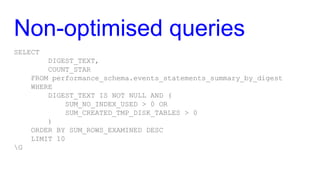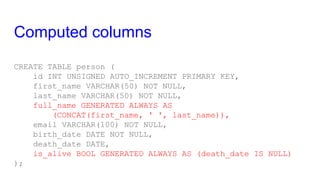How MySQL can boost (or kill) your application
- 1. How can MySQL boost Your applications?
- 2. How can MySQL boost Your applications? Mmh, wait...
- 3. How can MySQL boost (or kill) Your applications?
- 4. € whoami ● Federico Razzoli ● Freelance consultant ● Writing SQL since MySQL 2.23 [email protected] ● I love open source, sharing, Collaboration, win-win, etc ● I love MariaDB, MySQL, Postgres, etc ○ Even Db2, somehow
- 5. This talk applies to... ● MySQL ● Percona Server ● MariaDB And most information applies, with some changes, to: ● All other relational DBMSs
- 6. This talk is not about... ● ORMs ● PHP code ● Query optimisation ● SQL_MODE ● MySQL characteristics that I don’t want to advertise ○ For a reason ○ But you are allowed to ask questions that I hope you don’t ask ○ I will still say “thank you for your question”
- 7. Why do I want to talk about MySQL at a PHP event?
- 8. Good practices™ for your dev machine
- 9. Configuration /etc/mysql/my.cnf should always contain: log_slow = 1 long_query_time = 0 performance_schema = 1
- 10. Slow log ls -1 $( mysql -e 'SELECT @@datadir' ) | grep slow ● Empty the slow log before a test ○ echo '' > /path/to/slowlog ● Check the slow log when you want to check your queries ○ Includes query duration, rows returned and some details on the execution plan
- 11. Performance Schema Before a test: TRUNCATE TABLE performance_schema.events_statements_summary_by_digest;
- 12. Queries that fail SELECT DIGEST_TEXT, COUNT_STAR FROM performance_schema.events_statements_summary_by_digest WHERE DIGEST_TEXT IS NOT NULL AND SUM_ERRORS > 0 -- SUM_WARNINGS ORDER BY COUNT_STAR DESC LIMIT 10 G
- 13. Queries with no results SELECT * FROM performance_schema.events_statements_summary_by_digest WHERE ( TRIM(DIGEST_TEXT) LIKE 'SELECT%' OR TRIM(DIGEST_TEXT) LIKE 'CREATE%TABLE%SELECT%' OR TRIM(DIGEST_TEXT) LIKE 'DELETE%' OR TRIM(DIGEST_TEXT) LIKE 'UPDATE%' OR TRIM(DIGEST_TEXT) LIKE 'REPLACE%' ) AND SUM_ROWS_SENT = 0 AND SUM_ROWS_AFFECTED = 0 ORDER BY SUM_ROWS_EXAMINED DESC LIMIT 10 G
- 14. Non-optimised queries SELECT DIGEST_TEXT, COUNT_STAR FROM performance_schema.events_statements_summary_by_digest WHERE DIGEST_TEXT IS NOT NULL AND ( SUM_NO_INDEX_USED > 0 OR SUM_CREATED_TMP_DISK_TABLES > 0 ) ORDER BY SUM_ROWS_EXAMINED DESC LIMIT 10 G
- 15. Indexes
- 16. An index is an ordered data structure ● Think to a phone book ● It is a table with an index on (last_name, first_name) ● First takeaway: the order of columns matters ● Your mind contains a pretty good SQL optimiser ● When you want to know which queries can be optimised with a certain index, think to a phone book
- 17. Which queries can be optimised? ● WHERE last_name = 'Baker' ● WHERE first_name = 'Tom' ● WHERE first_name = 'Tom' AND last_name = 'Baker' ● WHERE last_name = 'Baker' AND first_name = 'Tom'
- 18. Rule #1: A query can use a whole index Or a leftmost part of an index
- 19. Which queries can be optimised? ● WHERE last_name = 'Baker' ● WHERE last_name <> 'Baker' ● WHERE last_name > 'Baker' ● WHERE last_name >= 'Baker' ● WHERE last_name < 'Baker' ● WHERE last_name =< 'Baker'
- 20. Which queries can be optimised? ● WHERE last_name > 'B' AND last_name < 'C' ● WHERE last_name BETWEEN 'B' AND 'BZZZZZZZZZZZ'; ● WHERE last_name LIKE 'B%' ● WHERE last_name LIKE '%ake%' ● WHERE last_name LIKE '%r'
- 21. Rule #2: You can use an index to find a value Or a (closed/open) range
- 22. Which queries can be optimised? ● WHERE last_name = 'Nimoy' OR first_name = 'Leonard' ● WHERE last_name = 'Nimoy' OR last_name = 'Shatner'
- 23. Rule #3: OR on different columns Is not fully optimised
- 24. Which queries can be optimised? ● WHERE last_name = 'Nimoy' AND first_name = 'Leonard' ● WHERE last_name = 'Nimoy' AND first_name > 'Leonard' ● WHERE last_name > 'Nimoy' AND first_name = 'Leonard' ● WHERE last_name > 'Nimoy' AND first_name > 'Leonar0d'
- 25. Rule #4: The index use Stops at the first range
- 26. Use proper SQL
- 27. N + 1 problem Don’t: foreach ( SELECT * FROM author WHERE a.LIKE 'P%'; ) SELECT * FROM book WHERE author_id = ?; Do: SELECT a.first_name, a.last_name, b.* FROM book b JOIN author a ON b.id = a.book_id WHERE a.last_name = 'P%';
- 28. Dealing with duplicates INSERT INTO product (id, ...) VALUES (24, ...); INSERT IGNORE INTO product (id, ...) VALUES (24, ...); INSERT INTO product (id, ...) ON DUPLICATE KEY UPDATE name = 'Sonic screwdriver'; REPLACE INTO product (id, ...) VALUES (24, ...); DELETE IGNORE ... UPDATE IGNORE ...
- 29. Insert many rows INSERT INTO user (first_name, last_name, email) VALUES ('William', 'Hartnell', '[email protected]'), ('Tom', 'Baker', '[email protected]'), ('Jody', 'Wittaker', '[email protected]'); INSERT INTO `order` (user_id, product_id) VALUES (LAST_INSERT_ID(), 24);
- 30. Delete/Update many tables DELETE `order`, user FROM `order` INNER JOIN `order` ON order.user_id = user.id WHERE user = 24; UPDATE `order`, user FROM `order` INNER JOIN `order` ON order.user_id = user.id SET status = 'CANCELLED' WHERE user = 24;
- 31. Read+Delete data Only MariaDB: DELETE FROM user WHERE id = 2424 RETURNING first_name, last_name;
- 32. Creating table with rows CREATE TABLE past_order LIKE `order`; INSERT INTO past_order SELECT * FROM `order` WHERE status IN ('SHIPPED', 'CANCELLED'); Or: CREATE TABLE customer SELECT u.id, u.first_name, u.last_name FROM user u JOIN `order` o ON u.id = o.user_id WHERE o.status <> 'CANCELED';
- 34. What are transactions? ACID ● Atomicity ○ All writes in a transaction fail or succeed altogether. ● Consistency ○ Data always switch from one consistent point to another. ● Isolation ○ Transactions are logically sequential. ● Durability ○ Data changes persist after system failures (crashes).
- 35. What are transactions? START TRANSACTION; SELECT … ; UPDATE … ; INSERT … ; COMMIT; START TRANSACTION; DELETE … ; INSERT … ; ROLLBACK; SET SESSION autocommit := 1; -- this is the default DELETE … ;
- 36. What are transactions? START TRANSACTION; SELECT qty FROM product -- why did we use "qty > 0"? WHERE id = 240 AND qty > 0 -- what is this? IN SHARE MODE; INSERT INTO orders (user_id, product_id) VALUES (24, 240); UPDATE product SET qty = qty - 1 WHERE id = 240; COMMIT;
- 37. Isolation levels ● READ UNCOMMITTED ○ You could see not-yet-committed changes. ● READ COMMITTED ○ Each query acquires a separate snapshot. ● REPEATABLE READ (default) ○ One snapshot for the whole transaction. ● SERIALIZABLE ○ Like REPEATABLE READ, but SELECTs are implicitly IN SHARE MODE SET TRANSACTION ISOLATION LEVEL READ COMMITTED; START TRANSACTION; ...
- 38. Use cases for READ UNCOMMITTED?
- 39. Use cases for READ UNCOMMITTED? ● Statistics (avg on 1M rows) ● “Hi Theresa, your last access was on 29th March” ● Delete old data
- 40. Use cases for READ COMMITTED?
- 41. Use cases for READ COMMITTED? ● Delete/update rows by id from multiple tables ● Show user’s payment history ● For each exam, show users who passed it
- 42. READ ONLY transactions ● Make sense with REPEATABLE READ ● 2 SELECTs will see consistent data ● Attempts to change data will return an error ● Performance optimisation ○ But not as much as READ UNCOMMITTED START TRANSACTION READ ONLY;
- 43. Ways to kill MySQL Having SELECT privilege is enough to kill MySQL! (or any RDBMS) Method 1: START TRANSACTION; SELECT * FROM `order`; SELECT SLEEP(3600 * 12);
- 44. Ways to kill MySQL Having SELECT privilege is enough to kill MySQL! (or any RDBMS) Method 2: START TRANSACTION; SELECT * FROM `order` WHERE id = 24 FOR UPDATE; SELECT SLEEP(3600 * 12);
- 46. CHECK constraints MySQL 8.0+, MariaDB 10.2+ CREATE TABLE person ( id INT UNSIGNED AUTO_INCREMENT PRIMARY KEY, first_name VARCHAR(50) NOT NULL, last_name VARCHAR(50) NOT NULL, email VARCHAR(100) NOT NULL, CHECK (email LIKE '_%@_%.__%'), birth_date DATE NOT NULL, death_date DATE, CHECK (birth_date <= death_date OR death_date IS NULL) );
- 47. Computed columns CREATE TABLE person ( id INT UNSIGNED AUTO_INCREMENT PRIMARY KEY, first_name VARCHAR(50) NOT NULL, last_name VARCHAR(50) NOT NULL, full_name GENERATED ALWAYS AS (CONCAT(first_name, ' ', last_name)), email VARCHAR(100) NOT NULL, birth_date DATE NOT NULL, death_date DATE, is_alive BOOL GENERATED ALWAYS AS (death_date IS NULL) );
- 48. DEFAULT clauses MySQL 8.0+, MariaDB 10.2+ CREATE TABLE person ( id INT UNSIGNED AUTO_INCREMENT PRIMARY KEY, first_name VARCHAR(50) NOT NULL, last_name VARCHAR(50) NOT NULL, full_name VARCHAR(100) NOT NULL DEFAULT (CONCAT(first_name, ' ', last_name)), email VARCHAR(100) NOT NULL, birth_date DATE NOT NULL, death_date DATE, is_alive BOOL NOT NULL DEFAULT (death_date IS NULL) );
- 49. DEFAULT v. Computed columns ● Computed values cannot be changed ● Both regular and computed columns can be indexed ○ Your DBA will not consider this option ● Indexed computed columns will work “implicitly”: SELECT ... WHERE CONCAT(first_name, ' ', last_name) = 'Peter Capaldi'; ...but not in MariaDB
- 50. DEFAULT v. Computed columns On a computed column, you can also build: ● CHECK constraints ○ Enforce a minimum length for full_name ○ Reject dead users ● UNIQUE indexes ○ REPLACE(last_name, ' ', ''), first_name
- 51. How to kill MySQL In this case, it’s hard. ● DEFAULTs are normally lightweight ● The same is true for CHECKs ○ You cannot use a SELECT as a CHECK ● You can still try to make writes slow and fill the disk with computed columns that produce big values
- 52. How to kill MySQL For work-intensive workloads: ● UNIQUE may cause many disk reads ● FOREIGN KEYs cause many extra checks
- 53. JSON
- 54. Compose JSON values CREATE TABLE person ( id INT UNSIGNED AUTO_INCREMENT PRIMARY KEY, ... , data JSON NOT NULL DEFAULT ( JSON_OBJECT( 'id', id, 'emails', JSON_ARRAY(email_main, email_emergency), 'full_name', JSON_OBJECT( 'first', first_name, 'last', first_name, ) ) ) );
- 55. Extract values from JSON CREATE TABLE person ( id INT UNSIGNED AUTO_INCREMENT PRIMARY KEY, email_main VARCHAR(100) NOT NULL DEFAULT (JSON_EXTRACT(data, '$[0]')), email_emergency VARCHAR(100) NOT NULL DEFAULT (JSON_EXTRACT(data, '$[1]')), first_name VARCHAR(50) NOT NULL DEFAULT (JSON_EXTRACT(data, '$.full_name.first')), last_name VARCHAR(50) NOT NULL DEFAULT (JSON_EXTRACT(data, '$.full_name.last')), data JSON NOT NULL ... );
- 56. Thanks for being still awake!























































![Extract values from JSON
CREATE TABLE person (
id INT UNSIGNED AUTO_INCREMENT PRIMARY KEY,
email_main VARCHAR(100) NOT NULL
DEFAULT (JSON_EXTRACT(data, '$[0]')),
email_emergency VARCHAR(100) NOT NULL
DEFAULT (JSON_EXTRACT(data, '$[1]')),
first_name VARCHAR(50) NOT NULL
DEFAULT (JSON_EXTRACT(data, '$.full_name.first')),
last_name VARCHAR(50) NOT NULL
DEFAULT (JSON_EXTRACT(data, '$.full_name.last')),
data JSON NOT NULL ...
);](https://image.slidesharecdn.com/talkmysqlphp-190510093717/85/How-MySQL-can-boost-or-kill-your-application-55-320.jpg)
